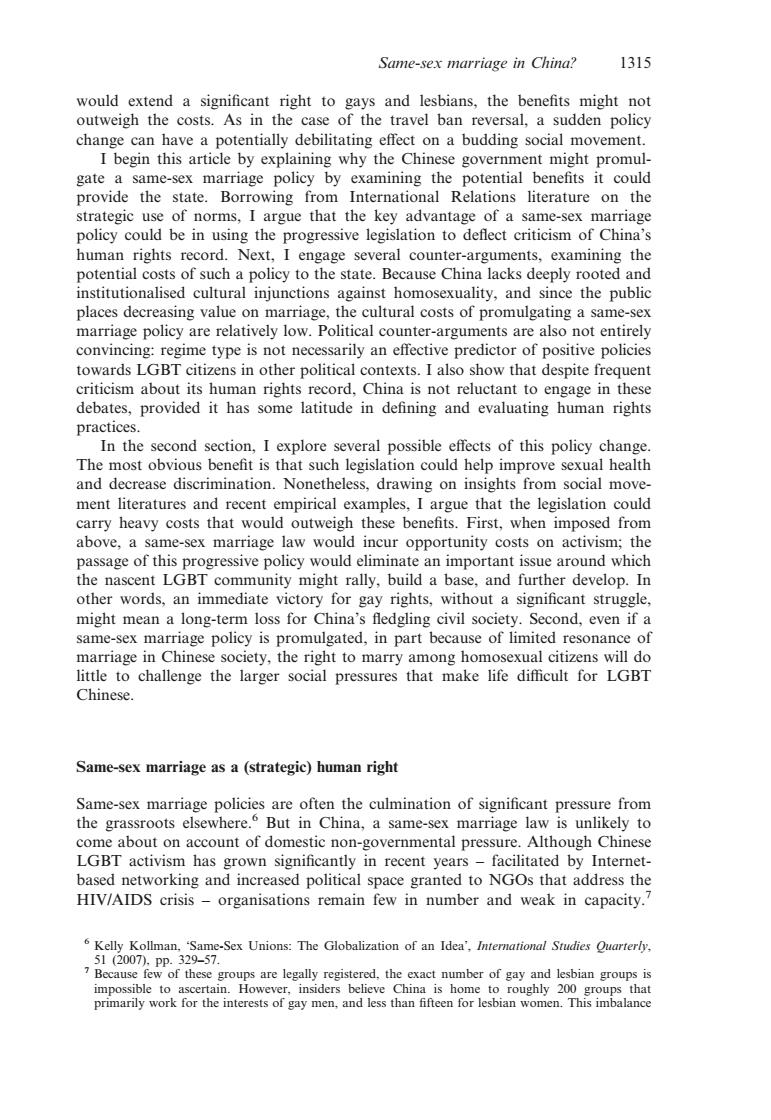正在加载图片...

Same-sex marriage in China? 1315 would extend a significant right to gays and lesbians,the benefits might not outweigh the costs.As in the case of the travel ban reversal,a sudden policy change can have a potentially debilitating effect on a budding social movement. I begin this article by explaining why the Chinese government might promul- gate a same-sex marriage policy by examining the potential benefits it could provide the state.Borrowing from International Relations literature on the strategic use of norms,I argue that the key advantage of a same-sex marriage policy could be in using the progressive legislation to deflect criticism of China's human rights record.Next,I engage several counter-arguments,examining the potential costs of such a policy to the state.Because China lacks deeply rooted and institutionalised cultural injunctions against homosexuality,and since the public places decreasing value on marriage,the cultural costs of promulgating a same-sex marriage policy are relatively low.Political counter-arguments are also not entirely convincing:regime type is not necessarily an effective predictor of positive policies towards LGBT citizens in other political contexts.I also show that despite frequent criticism about its human rights record,China is not reluctant to engage in these debates,provided it has some latitude in defining and evaluating human rights practices. In the second section,I explore several possible effects of this policy change. The most obvious benefit is that such legislation could help improve sexual health and decrease discrimination.Nonetheless,drawing on insights from social move- ment literatures and recent empirical examples,I argue that the legislation could carry heavy costs that would outweigh these benefits.First,when imposed from above,a same-sex marriage law would incur opportunity costs on activism;the passage of this progressive policy would eliminate an important issue around which the nascent LGBT community might rally,build a base,and further develop.In other words,an immediate victory for gay rights,without a significant struggle, might mean a long-term loss for China's fledgling civil society.Second,even if a same-sex marriage policy is promulgated,in part because of limited resonance of marriage in Chinese society,the right to marry among homosexual citizens will do little to challenge the larger social pressures that make life difficult for LGBT Chinese. Same-sex marriage as a (strategic)human right Same-sex marriage policies are often the culmination of significant pressure from the grassroots elsewhere.But in China,a same-sex marriage law is unlikely to come about on account of domestic non-governmental pressure.Although Chinese LGBT activism has grown significantly in recent years-facilitated by Internet- based networking and increased political space granted to NGOs that address the HIV/AIDS crisis-organisations remain few in number and weak in capacity.? 6 Kelly Kollman.Same-Sex Unions:The Globalization of an Idea'.International Studies Quarterly, 51(2007).pp.329-57. 7 Because few of these groups are legally registered,the exact number of gay and lesbian groups is impossible to ascertain.However,insiders believe China is home to roughly 200 groups that primarily work for the interests of gay men,and less than fifteen for lesbian women.This imbalancewould extend a significant right to gays and lesbians, the benefits might not outweigh the costs. As in the case of the travel ban reversal, a sudden policy change can have a potentially debilitating effect on a budding social movement. I begin this article by explaining why the Chinese government might promulgate a same-sex marriage policy by examining the potential benefits it could provide the state. Borrowing from International Relations literature on the strategic use of norms, I argue that the key advantage of a same-sex marriage policy could be in using the progressive legislation to deflect criticism of China’s human rights record. Next, I engage several counter-arguments, examining the potential costs of such a policy to the state. Because China lacks deeply rooted and institutionalised cultural injunctions against homosexuality, and since the public places decreasing value on marriage, the cultural costs of promulgating a same-sex marriage policy are relatively low. Political counter-arguments are also not entirely convincing: regime type is not necessarily an effective predictor of positive policies towards LGBT citizens in other political contexts. I also show that despite frequent criticism about its human rights record, China is not reluctant to engage in these debates, provided it has some latitude in defining and evaluating human rights practices. In the second section, I explore several possible effects of this policy change. The most obvious benefit is that such legislation could help improve sexual health and decrease discrimination. Nonetheless, drawing on insights from social movement literatures and recent empirical examples, I argue that the legislation could carry heavy costs that would outweigh these benefits. First, when imposed from above, a same-sex marriage law would incur opportunity costs on activism; the passage of this progressive policy would eliminate an important issue around which the nascent LGBT community might rally, build a base, and further develop. In other words, an immediate victory for gay rights, without a significant struggle, might mean a long-term loss for China’s fledgling civil society. Second, even if a same-sex marriage policy is promulgated, in part because of limited resonance of marriage in Chinese society, the right to marry among homosexual citizens will do little to challenge the larger social pressures that make life difficult for LGBT Chinese. Same-sex marriage as a (strategic) human right Same-sex marriage policies are often the culmination of significant pressure from the grassroots elsewhere.6 But in China, a same-sex marriage law is unlikely to come about on account of domestic non-governmental pressure. Although Chinese LGBT activism has grown significantly in recent years – facilitated by Internetbased networking and increased political space granted to NGOs that address the HIV/AIDS crisis – organisations remain few in number and weak in capacity.7 6 Kelly Kollman, ‘Same-Sex Unions: The Globalization of an Idea’, International Studies Quarterly, 51 (2007), pp. 329–57. 7 Because few of these groups are legally registered, the exact number of gay and lesbian groups is impossible to ascertain. However, insiders believe China is home to roughly 200 groups that primarily work for the interests of gay men, and less than fifteen for lesbian women. This imbalance Same-sex marriage in China? 1315